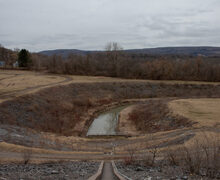SU’s Faculty and Staff for Justice in Palestine discuss conflict impacts in Lebanon, Palestine
Roxanne Boychuck | Asst. Copy Editor
Syracuse University’s Faculty and Staff for Justice in Palestine hosted a conversation Monday highlighting connections between Palestine and Lebanon. Five FSJP members comprised of SU faculty discussed how to support both communities amid the Israel-Hamas war.
Get the latest Syracuse news delivered right to your inbox.
Subscribe to our newsletter here.
Syracuse University’s Faculty and Staff for Justice in Palestine hosted “A Conversation: The War on Gaza and its Broader Impact” Monday afternoon. The event highlighted connections between Palestinian and Lebanese communities.
During Monday’s conversation, five FSJP members — all SU faculty — led a group discussion about how to support Palestinian and Lebanese people amid the ongoing Israel-Hamas war. Moderators framed the dialogue around several discussion questions and asked attendees what they believed campus community members’ roles are in the conflict and whether they have commitments to “affirm dignity, security (and) freedom” for Palestine.
The discussion came after a Monday airstrike on Beirut by Israel. In recent weeks, Hezbollah and Lebanese officials have accused Israel of killing members of Hezbollah and injuring others, according to the New York Times. On Sept. 20, Israel launched an airstrike on Lebanon, killing a top Hezbollah commander, and has since struck multiple sites across Lebanon, the Times reported.
Carol Fadda, an associate professor of English, said this is a dangerous yet historical moment in United States academia. Fadda was one of four faculty members to “de-affiliate” from SU’s Middle Eastern Studies department in mid-February, citing their discontent with MESP’s “general silence” regarding the Israel-Hamas war and broader Palestinian perspectives.
“We are here today as educators, as scholars, as activists who have collectively spent the length of our careers studying and teaching about the Middle East, about Palestine, Lebanon and surrounding countries, about colonial histories and liberation struggles across the Global South,” Fadda said. “We are also here as members of communities that are in deep mourning.”
In response to the war, student-led pro-Palestine protests emerged at college campuses across the country, which have since resulted in disciplinary actions including arrests, suspensions and expulsions. From late April to mid-May, student demonstrators established a Gaza Solidarity Encampment on SU’s campus. As of Sept. 13, SU has initiated conduct code violation proceedings against seven students involved with the GSE.
Attendees said they believe universities’ respective responses to these demonstrations across the country reflect an attempt to censor conversations about Palestine on college campuses.
Amy Kallander, a professor in SU’s History department who also renounced her MESP affiliation, talked about colonial history in the Middle East and highlighted how Palestine was once colonized by the British. British-colonial rule in Palestine began after World War I and was inhabited by a Jewish-minority and Arab-majority population, according to BBC News.
Kallander said the conflict between Israel and Palestine was a result of the growth of Zionist movements and ideologies.
“This has not been going on forever, this is a man-made conflict and one we can resolve,” Kallander said.
Fadda said the history between Lebanon and Israel also goes back decades, with long-standing tension along the Lebanese and Israeli border. She also said these conflicts are “U.S.-led wars” and claimed the U.S. profits off of supplying weapons to Israel and other countries.
FSJP members also discussed the group’s principles of unity while navigating the conversation. Biko Gray, associate professor in SU’s Religion department, said that while FSJP is trying to advocate for Palestine and Lebanon, it also stands against antisemitism and racism.
Gray said FSJP’s advocacy is prompted by both emotional connection to the people of Gaza and pursuing justice. He said he believes media outlets have described ongoing conflicts without providing context of historic violence and that resistance in solidarity would challenge the narrative used in the media.
“Description of violence is not the same as the prescription of violence,” Gray said.
Dana Olwan, associate professor in SU’s Women’s and Gender Studies department, said free speech and academic freedom do not extend to people living in Gaza. Olwan, another professor who disaffiliated from MESP, said western universities have played a role in censoring what is happening in Gaza.
One attendee, who requested to be unnamed, said censorship has experienced a “boomerang effect” on the media. She said tactics used to censor media in Palestine and northern Africa have been brought to western media. As a result, she struggles with what media to trust.
FSJP members and attendees said they still grapple with how to talk about Gaza and Lebanon without being censored.
“Tenure does not protect when it comes to Palestine,” Olwan said.
FSJP members emphasized to attendees that they will offer support for others who want to talk about Palestine and Lebanon.
Published on October 2, 2024 at 12:42 am
Contact Roxanne: rmboychu@syr.edu






